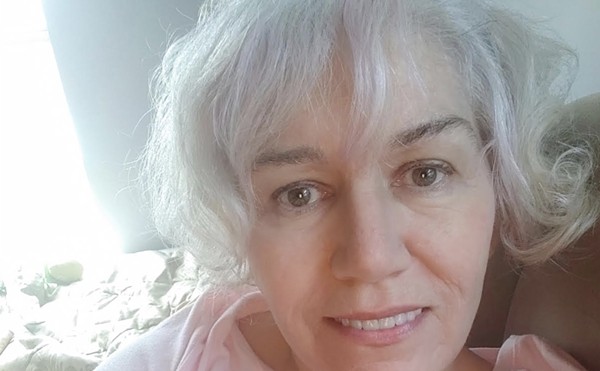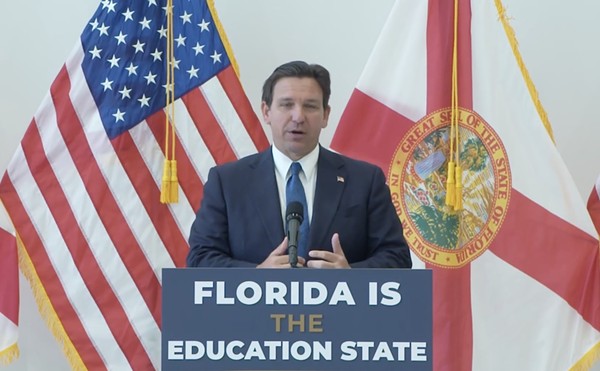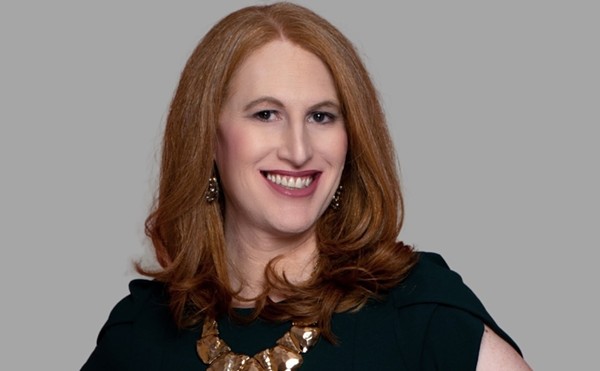A funny thing happened on the way to Glenda Hood's third coronation as mayor:
She pissed people off.
It happens, of course. It just doesn't happen often. Not in Orlando. Indeed, not for 20 years has there been a genuinely contested race for the job, which -- barring a runoff election -- will be decided Tuesday, March 14. And after winning two terms with less than token opposition, Hood is in the fight of her political life.
The man responsible, city councilman Bruce Gordy, isn't really offering an alternative agenda for the city, save for a slowdown in Hood's push for a performing-arts center. But he nonetheless has stolen some of Hood's key backers, secured endorsements from a city-council majority, and raised more money than she has. Meanwhile, populist Tom Levine, with no money but an equal place in public debates (in one case, wrestled from the moderator), is finding a niche among those disaffected or disgusted by the increasingly nasty tone of the Hood-Gordy confrontation.
For Hood -- whose pronouncements, according to other elected officials, often take on the tone of scoldings -- it's merely the byproduct of being in charge.
"Leadership isn't easy," she says. "People aren't always going to agree with you. Leadership is being willing to stand up and face those challenges that are before you. Leadership is also about having respect for somebody else. That's what people need to focus on, and I think that's what people should learn."
Her sole opponent four years ago, Steve Villard, is a divorced fathers'-rights advocate whose "Steve for Mayor" signs -- spray-painted on cardboard -- are again popping up as his name joins those of the others on the current ballot. What happened in the interim to engage real opposition for Hood this time?
She jumped, essentially all by herself, aboard an imaginary commuter rail line linking downtown with a factory-outlet shopping mall.
Until Hood engineered that singular light rail vote last September, Gordy, a College Park dentist, was just another vote on a council whose six members rarely raised their voices against Hood. That changed when Hood pulled a virtual rabbit-out-of-a-hat act, briefly reviving a rail line after the Orange County Commission had shot it dead. It wasn't the vote that infuriated Gordy and others on the council (a 3-3 split left Hood to tip the vote in favor; until then, Gordy and Hood both had backed the joint city-county project). What made them angry were Hood's tactics.
They complained she did it without warning. They complained she hadn't kept them informed. They complained that she expected them to vote on something for which there'd been no briefing -- and little advance notice to the public.
Worse, they complained it happened all the time.
Once the eruption started, the frustrations kept flowing.
"The reason I'm doing this, the reason I got into this race in the first place, is the fact that for the last two years, specifically the last six months, there's been a level of frustration about not having any say-so in government," says Gordy. The light-rail action "is further evidence of the way we are operating now. Whatever the mayor decides is best for us -- the community -- she's going to do it. Whatever it takes to drive it through, she'll do it."
Gordy's challenge since his November announcement has been to define his purpose. After all, during the six years that he and Hood have served together, their identities on new public policies have been virtually identical.
He promises to be more inclusive and share the power. Ironically, that's similar to the pledge the mayor made eight years ago when she took over from three-term predecessor Bill Frederick, about whom council members eventually said the same things now being said about Hood. And council aside, inclusiveness remains Hood's issue as well -- and one that she's genuinely taken beyond City Hall with neighborhood programs, resident surveys, grant monies and task forces.
Since 1995, the Mayor's Neighborhood Matching Grants program has funded 177 projects at a cost of $841,500; in-kind contributions from local businesses more than doubled the amount. Since 1998, another program along the same lines, the Mayor's Educational Partnership Grants, funded 25 projects at a cost of $190,000. Projects typically involved posting a pretty sign to establish the neighborhood's identity. But the money also subsidized computer labs, job training and a tour of colleges for high-school students -- gestures that have helped to solidify Hood's support, particularly in some of the city's African-American neighborhoods.
But it's here where divisions between the superficial and the substantial also begin to emerge, lending weight to the council's criticisms of Hood's dictatorial style. For example, in 1995 Hood convened a task force to help downtown churches that felt threatened by the increase in establishments seeking city licenses to sell alcohol; a compromise created a comfortable buffer between the two, and the council embraced it. But when a mayor's task force on late-night club hours recommended a 4 a.m. closing time, Hood disregarded the advice and reduced it to 3 a.m. The months of debate by the appointed citizens' panel simply didn't carry any weight.
Moreover, though residents often are invited to participate in discussions, that participation is guided toward the desired purpose. Hood singles out the "Neighborhood Report Card" survey she periodically sends out, asking residents to rate priorities from among broad topics such as traffic, education and environmental cleanup. But on a survey question four years ago about the proposed performing-arts complex, she asked, "What kind of activities and programs would you like the complex to offer?" She didn't ask, "Is this a good idea?"
Such a complex has been part of the city's long-range plan since before Hood became mayor. But she pushed it front and center, seeking backers, securing an architect, arranging a swap of land across Orange Avenue from City Hall for the project, budgeting money to move a perfectly good fire station out of its way, and appointing a city administrator, Brenda Robinson, to take the lead on the center and related projects like the envisioned cultural corridor and downtown theater district. And in their debates, Gordy has made the performing-arts center an issue, insisting that public spending on the project is better steered elsewhere.
"The city of Orlando, the government, has no business doing it, because it will suck the money out of the arts community," he says. But he doesn't oppose it -- and in fact, sounds a note similar to Hood's. "If the private sector will fund it and establish an endowment that will generate enough income on an annual basis to sustain it, whether it's a winner or loser, whether it makes money or doesn't ... if we can do that, it'd be fabulous," he says.
Cost estimates range upwards of $160 million for the project. And Hood insists it's being steered solely by the needs of the University of Central Florida and Orange County public schools. "And remember," she says, "we're the third-largest job market for arts and entertainment in the United States."
Still, Gordy has tried to use it as an example of Hood's heavy hand, citing in particular the city's designs to include a tract owned by First United Methodist Church. Trustees of the church recently said they don't want to sell and hired an attorney to fend off condemnation -- until two weeks ago, when the city assured them no such thing would happen. (Hood sees possible solutions in another land swap.) To counter the negative image, along with Gordy's charge that church officials were never told of the plans, Hood has since produced a 1992 letter from Fred Peed, former chairman of the trustees, to then-Mayor Frederick, in which Peed offered to sell the property and wrote, "... `W`e support the city in this plan as a positive step in the growth and redevelopment of Orlando."
Besides, as Hood observed in a debate, Gordy has backed the arts center as a council member at every turn so far.
Hood, who turns 50 on March 10, has pitched no grand plan to carry her through another four years, save for more of the same.
But that's plenty. Under her watch, the city chased and lost a major-league baseball franchise; spent two years sifting developers who will transform the former Naval Training Center into a neighborhood of as many as 3,200 people (and create a $6.1 million trust fund for homeless services in the process); spent millions of dollars with no sign of turning around the troubled Parramore area on downtown's west side; pushed through incentives to lure high-end housing to downtown's east side as a potential magnet to help resurrect the retail core; signed on to a regional bid with the cities of Tampa Bay to pursue the 2012 Summer Olympics; and, most recently, adopted a $30 million parks expansion program.
Hood boasts that city property taxes have not been raised during her tenure, though she doesn't mention her lobbying in 1997 for a failed penny increase in the sales tax.
Gordy's most concrete proposal is to add sidewalks along 60 of the 119 miles of city streets that don't have them. He also wants to hire 40 new police officers, work with schools for more after-school activities for kids (his wife, Susu, works with the Weekends program), halt incompatible infill development, and put in place a plan to stabilize the Parramore district. "What we've tried to do over there is have government do it," he says. "What we need to do is work with private enterprise."
A College Park dentist for 20 years, Gordy balances his council role by sitting on the board for the Healthcare Center for the Homeless of Central Florida, where he created a volunteer dental clinic; serving as chairman of the indigent clinic at Orange County Vocational School; and as team dentist for the Orlando Magic, Miracle and Solar Bears sports teams, among other affiliations. He also served on the College Park merchants and neighborhood associations.
Such commitments, says Hood, are the reason part-time council members aren't as active on advisory or planning boards as she'd like -- her counter to the charge that they're kept in the dark. "But the mayor, the CEO, being full-time, is able to be involved in those things, because that's the responsibility placed on the shoulders of that individual And that's what the citizens expect of us," she says.
Acting early to enact his pledge that, as mayor, he'd spread those responsibilities around, Gordy on Feb. 21 made a surprise nomination of council member Don Ammerman to fill Hood's soon-to-expire seat on the Greater Orlando Aviation Authority board. The majority backing Gordy in the mayor's race stood with him. Hood -- unable to head it off, and unaccustomed to losing -- was furious.
The victors defended their approach as no more sudden than Hood's light-rail rally. But the bitterness was accumulated.
At times, in fact, the two candidates have seemed not to be running against each other at all, but rather against outside forces that represent their interests.
Hood has railed in debates against attorney John Morgan and political consultant and radio talk-show host Doug Guetzloe, both vocal light-rail critics who have embraced Gordy as the anti-Hood. And Gordy takes aim at the Orlando Sentinel, which has endorsed Hood, as much as he targets the incumbent.
Gordy's anger follows a puzzling blunder in which he issued a written statement that he would not address rumors -- and then proceeded to list the rumors about Hood that he would not discuss. The next day, Feb. 25, he apparently corrected himself on the matter of a conversation he says he had with SunTrust bank officials "at their request" about a rumored loan involving Hood. "I would just tell you today that there's nothing to it," Sentinel reporter Scott Maxwell quoted Gordy as saying. "I'll be honest. I probably didn't word it too well." The front-page Sentinel headline that resulted read, "Gordy says he lied about Hood."
A day later readers were greeted with another reversal: "Angry Gordy says he didn't lie." A SunTrust spokeswoman said bank officials had, in fact, met with Gordy on the two occasions he described. The meetings, however, were arranged at Gordy's request as part of his fund-raising efforts. Gordy was insistent. "I told the truth no matter what the Orlando Sentinel chooses to write," he said in a letter handed out at a subsequent debate. What, exactly, the truth is, Gordy won't say any more. "We want to move on," says his campaign manager, Paul Seago.
Whether he moves on to the mayor's office -- or whether it turns out that his worst foe is not Hood but rather himself -- will be revealed Tuesday.

















